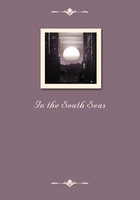
第45章 IN A CANNIBAL VALLEY(3)
'Mikael -Kaoha,Mikael!'From the doorstep,from the cotton-patch,or out of the deep grove of island-chestnuts,these friendly cries arose,and were cheerily answered as we passed.In a sharp angle of a glen,on a rushing brook and under fathoms of cool foliage,we struck a house upon a well-built paepae,the fire brightly burning under the popoi-shed against the evening meal;and here the cries became a chorus,and the house folk,running out,obliged us to dismount and breathe.It seemed a numerous family:we saw eight at least;and one of these honoured me with a particular attention.This was the mother,a woman naked to the waist,of an aged countenance,but with hair still copious and black,and breasts still erect and youthful.On our arrival Icould see she remarked me,but instead of offering any greeting,disappeared at once into the bush.Thence she returned with two crimson flowers.'Good-bye!'was her salutation,uttered not without coquetry;and as she said it she pressed the flowers into my hand -'Good-bye!I speak Inglis.'It was from a whaler-man,who (she informed me)was 'a plenty good chap,'that she had learned my language;and I could not but think how handsome she must have been in these times of her youth,and could not but guess that some memories of the dandy whaler-man prompted her attentions to myself.Nor could I refrain from wondering what had befallen her lover;in the rain and mire of what sea-ports he had tramped since then;in what close and garish drinking-dens had found his pleasure;and in the ward of what infirmary dreamed his last of the Marquesas.But she,the more fortunate,lived on in her green island.The talk,in this lost house upon the mountains,ran chiefly upon Mapiao and his visits to the CASCO:the news of which had probably gone abroad by then to all the island,so that there was no paepae in Hiva-oa where they did not make the subject of excited comment.
Not much beyond we came upon a high place in the foot of the ravine.Two roads divided it,and met in the midst.Save for this intersection the amphitheatre was strangely perfect,and had a certain ruder air of things Roman.Depths of foliage and the bulk of the mountain kept it in a grateful shadow.On the benches several young folk sat clustered or apart.One of these,a girl perhaps fourteen years of age,buxom and comely,caught the eye of Brother Michel.Why was she not at school?-she was done with school now.What was she doing here?-she lived here now.Why so?-no answer but a deepening blush.There was no severity in Brother Michel's manner;the girl's own confusion told her story.
'ELLE A HONTE,'was the missionary's comment,as we rode away.
Near by in the stream,a grown girl was bathing naked in a goyle between two stepping-stones;and it amused me to see with what alacrity and real alarm she bounded on her many-coloured under-clothes.Even in these daughters of cannibals shame was eloquent.
It is in Hiva-oa,owing to the inveterate cannibalism of the natives,that local beliefs have been most rudely trodden underfoot.It was here that three religious chiefs were set under a bridge,and the women of the valley made to defile over their heads upon the road-way:the poor,dishonoured fellows sitting there (all observers agree)with streaming tears.Not only was one road driven across the high place,but two roads intersected in its midst.There is no reason to suppose that the last was done of purpose,and perhaps it was impossible entirely to avoid the numerous sacred places of the islands.But these things are not done without result.I have spoken already of the regard of Marquesans for the dead,making (as it does)so strange a contrast with their unconcern for death.Early on this day's ride,for instance,we encountered a petty chief,who inquired (of course)where we were going,and suggested by way of amendment.'Why do you not rather show him the cemetery?'I saw it;it was but newly opened,the third within eight years.They are great builders here in Hiva-oa;I saw in my ride paepaes that no European dry-stone mason could have equalled,the black volcanic stones were laid so justly,the corners were so precise,the levels so true;but the retaining-wall of the new graveyard stood apart,and seemed to be a work of love.The sentiment of honour for the dead is therefore not extinct.And yet observe the consequence of violently countering men's opinions.Of the four prisoners in Atuona gaol,three were of course thieves;the fourth was there for sacrilege.
He had levelled up a piece of the graveyard -to give a feast upon,as he informed the court -and declared he had no thought of doing wrong.Why should he?He had been forced at the point of the bayonet to destroy the sacred places of his own piety;when he had recoiled from the task,he had been jeered at for a superstitious fool.And now it is supposed he will respect our European superstitions as by second nature.